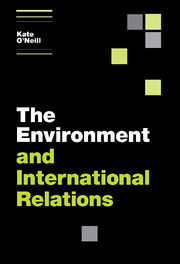Book contents
- Frontmatter
- Contents
- Preface
- Acknowledgements
- List of commonly used abbreviations
- 1 Introduction: The environment and international relations
- 2 International environmental problems
- 3 Actors in international environmental politics
- 4 State-led global environmental governance: International cooperation and regime formation
- 5 The impacts and effectiveness of environmental treaty regimes
- 6 Global economic governance and the environment
- 7 Non-state global environmental governance
- 8 Conclusions: The environment and international relations in the twenty-first century
- References
- Index
- References
7 - Non-state global environmental governance
Published online by Cambridge University Press: 05 June 2012
- Frontmatter
- Contents
- Preface
- Acknowledgements
- List of commonly used abbreviations
- 1 Introduction: The environment and international relations
- 2 International environmental problems
- 3 Actors in international environmental politics
- 4 State-led global environmental governance: International cooperation and regime formation
- 5 The impacts and effectiveness of environmental treaty regimes
- 6 Global economic governance and the environment
- 7 Non-state global environmental governance
- 8 Conclusions: The environment and international relations in the twenty-first century
- References
- Index
- References
Summary
In October 1993, 130 representatives from twenty-six countries met in Toronto, Canada, to inaugurate a governance regime designed to protect the world's forests. Participants agreed on ten principles for sustainable forest management, from controlling harvests to ensure steady timber yields over time while protecting fragile ecosystems, to protecting the rights of local forest-dwellers. The implementation of these principles would not be cost-free, and monitoring compliance hard to achieve. Nonetheless, participants agreed that this program represented a significant step forward in global forest conservation, while still allowing forest owners to benefit economically.
This governance institution – the Forest Stewardship Council (FSC) – now covers 67 million hectares of forest across sixty-five countries. In many ways, it looks something like the treaty regimes we have examined in previous chapters. But, in many more ways, it is critically different. First, none of the participants at the Toronto meeting were government representatives. Instead, the driving force behind the establishment of the FSC was a coalition of NGOs, forest owners and timber companies, and forest-dwelling communities, led by the World Wildlife Fund (WWF), a leading international NGO. Second, the FSC achieves its goals through the transmission of information and the power of the market. If a timber-producing firm signs up to its standards, it agrees to allow an independent auditor to certify its compliance with FSC principles.
- Type
- Chapter
- Information
- The Environment and International Relations , pp. 167 - 196Publisher: Cambridge University PressPrint publication year: 2009



